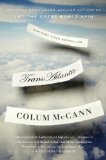Summary | Excerpt | Reading Guide | Reviews | Beyond the Book | Readalikes | Genres & Themes | Author Bio

A Novel
by Colum McCann
THE NEWSPAPERS SAID anything was possible now. The world was made tiny. The League of Nations was being formed in Paris. W. E. B. Du Bois convened the Pan-African Congress with delegates from fifteen countries. Jazz records could be heard in Rome. Radio enthusiasts used vacuum tubes to transmit signals hundreds of miles. Some day soon it might be possible to read the daily edition of the San Francisco Examiner in Edinburgh or Salzburg or Sydney or Stockholm.
In London, Lord Northcliffe of the Daily Mail had offered £10,000 to the first men to land on one side of the Atlantic or the other. At least four other teams wanted to try. Hawker and Grieve had already crashed into the water. Others, like Brackley and Kerr, were positioned in airfields along the coast, waiting for the weather to turn. The flight had to be done in seventy-two hours. Nonstop.
There were rumors of a rich Texan who wanted to try, and a Hungarian prince and, worst of all, a German from the Luftstreitkräfte who had specialized in long-range bombing during the war. The features editor of the Daily Mail, a junior of Lord Northcliffe's, was said to have developed an ulcer thinking about a possible German victory.
—A Kraut! A bloody Kraut! God save us!
He dispatched reporters to find out if it was possible that the enemy, even after defeat, could possibly be ahead in the race. On Fleet Street, down at the stone, where the hot type was laid, he paced back and forth, working the prospective headlines over and over. On the inside of his jacket his wife had stitched a Union Jack, which he rubbed like a prayer cloth.
—Come on boys, he muttered to himself. Hup two. On home now, back to Blighty.
EVERY MORNING THE two airmen woke in the Cochrane Hotel, had their breakfast of porridge, eggs, bacon, toast. Then they drove through the steep streets, out the Forest Road, towards a field of grass sleeved with ice. The wind blew bitter blasts off the sea. They rigged wires into their flight suits so they could run warmth from a battery, and they stitched extra fur on the inside flaps of their helmets, their gloves, their boots.
A week went by. Two weeks. The weather held them back. Cloud. Storm. Forecast. Every morning the men made sure they were carefully shaved. A ritual they performed at the far end of the field. They set up a steel washbasin under a canvas tent with a little gas burner to heat the water. A metal hubcap was used as a mirror. They put razor blades in their flight kits for when they landed: they wanted to make sure that if they were to arrive in Ireland, they would be fresh, decently shaved, presentable members of Empire.
In the lengthening June evenings, they fixed their ties, sat under the wingtips of the Vimy, and spoke eloquently to the Canadian, American, British reporters who gathered for the flight. Alcock was twenty-six years old. From Manchester. He was lean, handsome, daring, the sort of man who looked straight ahead but stayed open to laughter. He had a head of ginger hair. A single man, he said he loved women but preferred engines. Nothing pleased him more than to pull apart the guts of a Rolls-Royce, then put her back together again. He shared his sandwiches with the reporters: often there was a thumbprint of oil on the bread.
Brown sat on the wooden crates alongside Alcock. He already seemed old at thirty-two. His bum leg forced him to carry a walking stick. He had been born in Scotland, but raised near Manchester. His parents were American and he had a slight Yankee accent that he cultivated as best he could. He thought of himself as a man of the mid-Atlantic. He read the antiwar poetry of Aristophanes and admitted to the idea that he would happily live in constant flight. He was solitary but did not enjoy loneliness. Some said he looked like a vicar, but his eyes flared a far blue, and he had recently gotten engaged to a young beauty from London. He wrote Kathleen love letters, telling her that he wouldn't mind throwing his walking stick at the stars.
Excerpted from TransAtlantic by Colum McCann. Copyright © 2013 by Colum McCann. Excerpted by permission of Random House, a division of Random House, Inc. All rights reserved. No part of this excerpt may be reproduced or reprinted without permission in writing from the publisher.
Your guide toexceptional books
BookBrowse seeks out and recommends the best in contemporary fiction and nonfiction—books that not only engage and entertain but also deepen our understanding of ourselves and the world around us.